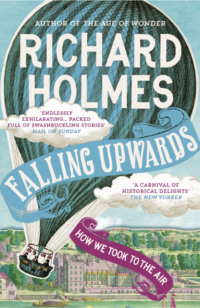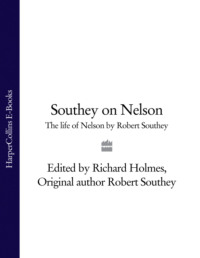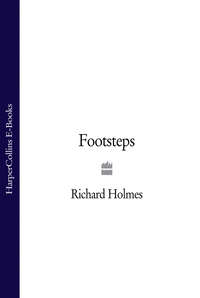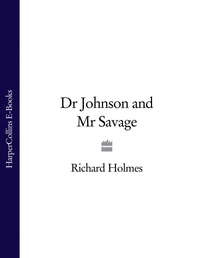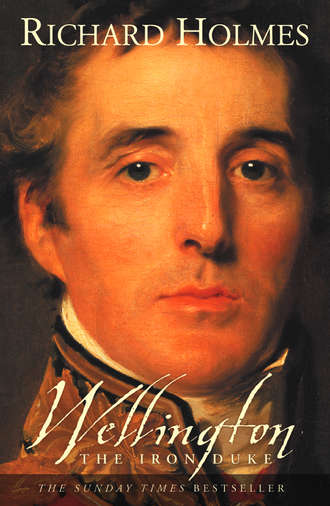
Полная версия
Wellington: The Iron Duke
In Henry Grattan the nationalist movement had an eloquent parliamentary leader, and shortly before the general election of 1789, Wesley was sent to Trim on his first political errand. The little town’s burgesses were in danger of making Grattan a freeman, something Dublin Castle was anxious to avoid. Wesley made his first political speech to an audience of eighty burgesses, reporting that he:
got up and said that the only reasons why Mr Grattan should get the freedom of the corporation was his respectability, that really if we were to admit every man because one of two people said he was respectable, the whole community would belong to the corporation, that he could never be of any use to us and would never attend, and that I would certainly object, however great my respect for him.22
During a break before the vote, Wesley moved about the room rallying his supporters: ‘I told my friends that it was a question of party and they must stick by me.’ Wesley duly carried the day. He then showed great discretion by declining to yield to ‘requests of all kinds’. An elderly voter asked what he proposed to do about £70 owed by Lord Mornington: ‘I would have nothing to do with it,’ replied Wesley, ‘as in the case of a General Election such a transaction would entirely vitiate my return.’
When the election came on 30 April 1790, Wesley was duly elected, and although opponents briefly disputed his return when the house met in July, they failed to proceed with their petition. He found himself sitting in a parliament in which at least two-thirds of the members owed their election to the proprietors of less than a hundred boroughs. A third of members enjoyed salaries or pensions from the government, absorbing an eighth of Irish revenue. A young Protestant barrister, Theobald Wolfe Tone, leader of the United Irishmen, already in 1790 more militant than Grattan, tellingly described the government’s well-fed but silent majority as ‘the common prostitutes of the Treasury Bench’.23 The harp of patronage played on, and in addition to his political role, Wesley became a captain in the 58th Regiment in 1791, slipping sideways into the 18th Light Dragoons the following year.
Yet there was still no clear career ahead of him. He dutifully voted for the government, scuttled about on Castle business, and acted for his brother Mornington in disputes over the mortgaged estate at Dangan. And there were more discreet family tasks. Mornington was living with a French courtesan, Gabrielle Hyacinthe Rolland, who bore him several children, but he had also managed to father a son in Ireland, and Arthur was entrusted with the maintenance of his brother’s ‘friend’ and the education of her son. Lord Westmoreland had replaced Lord Buckingham as viceroy in 1789 and economy did not figure among the ‘few good points’ this nobleman was acknowledged to possess. A captain’s pay did not go far and as aide-de-camp to Westmoreland, Arthur found himself drawing on the family agent for loans, and looking for a way of establishing his finances on a firmer footing: marriage seemed the answer.
There was already more to the relationship between Arthur Wesley and Kitty Pakenham than a young man’s quest for an heiress. The Pakenhams lived at Pakenham Hall, Castlepollard, in County Westmeath, a day’s ride from Dangan. Kitty and Arthur had probably met in Dublin in 1789 or 1790, for her charm and good looks made her a great favourite at the Castle, and Arthur became a frequent visitor to the Rutland Square house of her father, Lord Longford, a naval captain and keen agricultural improver. We cannot be sure what Longford would have made of a match between the couple, who were evidently very fond of one another, because he died in 1792 and was succeeded by his son Tom, who was himself to step up from baron to earl on his grandmother’s death in 1794. Perhaps it was Tom’s ‘incipient ideas of grandeur’ that persuaded Arthur to project himself in the best possible light. He borrowed enough money from Richard to buy a majority in the 33rd Regiment in April 1793. He even began to speak in parliament, seconding the address from the throne, deploring the imprisonment of Louis XVI and the French invasion of the Netherlands, and congratulating the government on its liberal attitude to Catholics.
If he hoped that all this was likely to impress Kitty’s brother, he was sorely mistaken. For if the Wesleys had lost most of their money, with nothing but mortgaged estates to show for it, the Pakenhams were comfortably off, and Kitty’s brother Ned had his majority bought for him when he was only seventeen. It cannot have been easy for Arthur to ask Tom, actually a little younger than he was, for Kitty’s hand in marriage. He was turned down flat. Arthur Wesley was a young man with very poor prospects, and Kitty could do far better.
I believe that the fatal interview took place in the library at Pakenham Hall, now known as Tullynally Castle, and still in the hands of the hospitable Pakenhams. The house is set in a landscaped park with a lake close by and views to distant hills, with treasures scattered casually about the place. A row of swords, hanging unlabelled from coat-hooks, includes slender small-swords, an essential part of a gentleman’s everyday dress until the end of the eighteenth century; a mighty meatcleaver of a light cavalry officer’s sword; a heavy, neo-classical (and quite useless) ceremonial sword of the Order of St Patrick; and an Edwardian sword that must have belonged to Brigadier General Lord Longford, killed commanding a Yeomanry brigade in an impossible attack at Gallipoli in August 1915.
Reading General Sir George Napier’s autobiography in the library at Tullynally Castle, I was struck, yet again, by the Irish contribution to the army of Wellington’s age. The Napier brothers, Charles, George and William, all served in the Peninsula and duly became generals. Such was their courage that they were repeatedly wounded, and in 1812 Wellington began a letter to their mother, Lady Sarah, telling her that George had lost his arm, with the words: ‘Having such sons, I am aware that you expect to hear of those misfortunes which I have more than once had to communicate to you.’24 The problem of balancing conscience and duty in the politics of the period is underlined by the fact that Sarah’s nephew, Lord Edward Fitzgerald, who had served as an infantry captain in America, became a leader of the United Irishmen and was mortally wounded resisting arrest on the eve of the Great Rising of 1798.
Ireland’s contribution to the British army cannot be judged simply by the officers it provided, whether from noble families like the Napiers or Pakenhams, or the sons of lesser squireens – men like Ensign Dyas of the 51st Regiment, ‘an Irishman whose only fortune was his sword’, whose exploits were a byword for sheer courage.25 The Ireland of turf-roofed cabins outside the park gates provided the army with a high proportion of its rank and file: 42 per cent of the Royal Artillery towards the end of the eighteenth century, and precisely the same proportion of the whole army by 1830. Although Irish soldiers were concentrated most heavily in ostensibly Irish regiments like the Connaught Rangers, there was scarcely a regiment without them: the 57th (West Middlesex) Regiment was 34 per cent Irish in 1809, and even the 92nd Regiment (Gordon Highlanders) was 6 per cent Irish in 1813.
Lord Longford’s rejection of his suit for Kitty was devastating, and a turning-point for Wesley. His violins, he noted bitterly, ‘took up too much of his time and thoughts’: he burnt them with his own hands soon afterwards, and never played again. He did his best, however, to tease a few more notes from the harp of patronage. Infantry battalions had two flank companies apiece, one of grenadiers and the other of light infantry, and he heard that some of these were to be brigaded together and sent abroad. He begged Mornington to intercede with the prime minister, and to
ask Mr Pitt to desire Lord Westmoreland to send me as Major to one of the flank corps. If they are to go abroad, they will be obliged to take officers from the line, and they may as well take me as anybody else … I think it is both dangerous and improper to remove any part of the army from this country at present, but if any part of it is to be moved, I should like to go with it, and have no chance of seeing service except with the flank corps, as the regiment I have got into as Major is the last for service.26
His appeal was unsuccessful, which was as well, for the flank companies from Ireland went off to die of yellow fever in Martinique. Mornington lent him more money, and with it he purchased a lieutenant colonelcy in the 33rd that September. He went off to command his regiment, immersing himself in the minutiae of its accounts and preparing standing orders that became a model of their kind.
An expedition to the coast of Normandy under Lord Moira was mooted, and the 33rd seemed likely to take part. Wesley resigned his parliamentary seat, found an affluent linen-draper who was prepared to deal with his Dublin debts, but then heard that his regiment was not to go after all. Then came good news: Lord Moira’s force would indeed include the 33rd, and would be sent to reinforce the Duke of York’s little army in Flanders. It was accompanied, as good news so often is, by bad. Lord Longford wrote to say that he was firmly resolved that a match with Kitty was impossible. Wesley, however, could not accept the decision as final for, as it was based on ‘prudential motives’, a change in his own circumstances might yet win him Kitty. He wrote and told her that if her brother ever relented, ‘my mind will still remain the same’.27
Wesley sailed from Cork in early June 1794 and arrived at Ostend on the 25th to join a campaign which had started with a flicker of promise but was already turning sour. The British government, trying hard to repair the damage done to its army by peacetime parsimony, had enlisted men as quickly as it could for the war against revolutionary France. The historian Sir John Fortescue reckoned that at least 30,000 men were enlisted into the regular army between November 1793 and March 1794.28 Amongst them was a corps of waggoners, the army’s first military transport unit, known from the colour of its uniform and the supposed origin of its members as ‘The Newgate Blues’. ‘A greater set of scoundrels never disgraced an army,’ complained an officer on the Duke of York’s staff.
The consequences of this rapid expansion were little short of disastrous. There were too few muskets: the 31st Regiment was composed chiefly of recruits, 240 of whom were unarmed. Many soldiers had not been issued with proper uniforms, but went to war in their ‘slop-clothing’, the barrack dress of linen jacket and trousers they received when they arrived at their depots. A high proportion of officers and men were poorly trained. Private William Surtees of the 56th Regiment was delighted to be posted to his battalion’s light company ‘as I considered it … an honour to be made a light-bob’, but was given no specialist training, and when he met properly trained French light infantry, he discovered that they ‘had greatly the advantage over us in point of shooting …’29 Fortescue complained that too many officers had attained their rank through exactly that mixture of patronage and purchase that had enabled Wesley to command a battalion at the age of 24 without any formal training:
The commanders of the new army, who had been juggled into seniority by the Government and the army-brokers, were not fit to command a company, much less a brigade. Some of them were boys of twenty-one who knew nothing of their simplest duties. Though they went cheerfully into action, they looked upon the whole campaign as an elaborate picnic … Thrust into the army to satisfy the claims of dependants, constituents, importunate creditors, and discarded concubines, many of these young men were at once a disgrace and an encumbrance to the force.30
The Duke of York’s Anglo-Hanoverian force was fighting alongside an Austrian army under the Prince of Coburg, and the future major general, John Gaspard Le Marchant (his birth in the Channel Islands accounting for his Gallic name), reckoned that the Austrians were ‘as superior to us as we are to the train-bands in the city’.31 The allies took Valenciennes in 1793 but then spent a terrible winter, worsened for the British by the government’s diversion of resources to the West Indies and the Mediterranean. By the time Wesley arrived, the French had launched a counter-offensive. Wesley, temporarily commanding a brigade containing the 8th and 44th in addition to his own regiment, was left to check the French at Ostend while Moira took the rest of the force on to join the Duke of York. With Moira safely away, Wesley deftly re-embarked his brigade and had it moved by sea to Antwerp, whence he joined the Duke of York before the rest of Moira’s force marched in. The episode demonstrated to him the enormous advantage conferred by seapower, especially when confronting an enemy who seemed supreme on land.
In mid-September 1794 Wesley had his baptism of fire just east of Breda. On the 14th, the French attacked the Duke of York’s advanced post at Boxtel on the River Dommel, and captured it and two battalions of German troops. The duke sent Major General Sir Ralph Abercromby with ten battalions of infantry and ten squadrons of cavalry to recover the place next day, but Abercromby almost collided with the main French force, slipping past eastwards, and was lucky to escape with the loss of ninety men, most of them prisoners. The 33rd helped check the attack, waiting quietly in line until their young colonel gave the order to fire on an approaching column. He had already learnt a valuable lesson about sea-power, and now he learnt another, about the merits of steady lines facing exuberant columns. Both were to prove invaluable.
Abercromby, whose bushy eyebrows gave him the air of a benevolent lion, called on Wesley a few days later to convey ‘the Duke of York’s thanks and his to the Thirty-third for their good conduct on the 15th’.32 The army retreated in terrible weather, and Wesley, commanding a brigade once more, found himself defending the line of the River Waal, whence he wrote to Mornington to say that he doubted if even the French army could keep the field in such conditions, and if the army went into winter quarters, he would be back in Ireland to deal with some problems on the family’s much-reduced estates. But winter quarters were a reflection of a more measured age, and the French kept up the pressure. ‘We turn out once, sometimes twice every night; the officers and men are harassed to death …’ wrote Wesley. ‘I have not had the clothes off my back for a long time, and generally spend the greater part of the night upon the bank of the river.’33 It was small wonder that he was plagued by a return of an old illness, an ‘aguish complaint from fatigue, damp etc’ which his doctor treated with pills containing ‘three grains of Calomel combined with three grains of the Cathartic Extract’. He was on the Waal from October 1794 to January 1795, and was only once visited by a general from headquarters. And when he rode over to headquarters, thirty miles away, he found it ‘a scene of jollifications’. A dispatch arrived while the port was circulating, and was airily waved away by a general who declared that it would keep till tomorrow. Wesley concluded that it was the leaders who were at fault, not their wretched and half-starved men. ‘Many of the regiments were excellent,’ he recalled, but:
no one knew anything of the management of an army … We had letters from England, and I declare that those letters told us more of what was passing at headquarters than we learned from the headquarters themselves … The real reason why I succeeded in my own campaigns is because I was always on the spot – I saw everything, and did everything myself.34
The army fell back to Bremen, whence it was to be evacuated by the navy, in appalling circumstances.
Far as the eye could reach over the whitened plain were scattered gun-limbers, wagons full of baggage, of stores, of sick men, sutlers’ carts and private carriages. Beside them lay the horses, dead; around them scores and hundreds of soldiers, dead; here a straggler who had staggered onto the bivouac and dropped to sleep in the arms of the frost; there a group of British and Germans around an empty rum-cask; here forty English Guardsmen huddled together around a plundered wagon; there a pack-horse with a woman lying alongside it, and a baby, swathed in rags, peeping out of the pack, with its mother’s milk turned to ice upon its lips – one and all stark, frozen, dead.35
Wesley sailed for England in March 1795, with his regiment close behind. The campaign marked the nadir of British fortunes. It embodied the characteristics often seen in the British army at the beginning of long conflicts: all the strains caused by rapid expansion, and commanders who failed to appreciate that the nature of war had changed. That dreadful winter in Holland taught Wesley much about war. It may not have told him what to do, but, as he observed later, he had ‘learnt what not to do, and that is always something’.
It was less than clear what the returning hero should do with himself, for pay as lieutenant colonel and aide-de-camp brought in only £500 a year and creditors abounded. Leaving his regiment encamped in Essex, he set off for Dublin in search of money and preferment. Trim dutifully returned him as its MP once more, and he laid siege to the new lord-lieutenant, Lord Camden, with supporting fire provided by his brother Mornington. He first hoped to be made secretary at war in the Irish government, which would have tripled his income at a stroke, but was soon forced to admit to Camden that: ‘I see the manner in which the Military Offices are filled and I don’t wish to ask for that which I know you can’t give me.’ This being the case, he changed his line of attack, now aiming for a civil office in the Treasury or Revenue boards, with the hand-wringing assurance that ‘nothing but the circumstances under which I labour would induce me to trouble Your Excellency’s Government’.36 When this assault also failed, Mornington proposed him as surveyor-general of the ordnance, an unhelpful shot as the post was already held by Kitty’s uncle, Captain Thomas Pakenham. Camden actually offered Wesley the post, and although he felt obliged to turn it down, the Pakenhams were not best pleased.
Firmly rebuffed, Wesley returned to his regiment, now at Southampton under orders to sail for the West Indies. He was pursued by a well-meaning letter from Lord Camden, who would be sorry to lose him but:
approve of your determination to accompany your reg’t to the West Indies, as I am convinced that a profession once embraced should not be given up. I shall be very glad if I can make some satisfactory arrangement for you against your come back, but if a vacancy should happen in the Revenue Board I fear the Speaker’s son must have the first.37
The 33rd embarked for the West Indies but a providential storm drove the fleet back to port after seven unpleasant weeks. Wesley was first quartered in Poole, but then went to convalesce in Dublin as his old agues returned. In the meantime, in the spring of 1796 with one of those sudden changes for which Whitehall is not unknown, the 33rd was sent, not to the West Indies, but to India.
Wesley, promoted colonel by seniority with effect from 3 May 1796, was determined to follow it, but there were arrangements to be made first. He resigned his seat and left advice on its management for his successor; received an assurance from Dublin Castle that it ‘should be very happy to relieve his mind from the embarrassment it feels on account of some pecuniary arrangements which he was obliged to leave unsettled’; but was pressed by his agent to ensure that Lord Mornington would deal with the £955 4s 8d of outstanding bills if something unpleasant happened. His future adversary Napoleon, now a général de division and just appointed to command the army of Italy, always rated luck as a great military virtue, and there is no doubt that Wesley was lucky that spring. He had escaped a voyage to the West Indies and an unhappy destiny in a yellow fever cemetery, and fortunate in leaving Ireland when he did. For, even in 1796, there was rebellion in the air: Grattan felt it ‘creeping in like a mist at the heels of the countryman’. The rebellion of 1798 was to be, as Thomas Pakenham has written, ‘the most violent and tragic event in Irish history between the Jacobite wars and the Great Famine’.38 The ‘Year of Liberty’ cost perhaps 30,000 men and women their lives, and in its aftermath Britain imposed on Ireland a union whose troubled legacy still persists. It was a good time to leave.
TWO
SEPOY GENERAL
THE INDIA for which Colonel Wesley set sail from Portsmouth in June 1796 was not yet a British possession, though his efforts were to help make it one. In 1600, Elizabeth I had given a royal charter to ‘The Company of Merchants of London trading into the East Indies’, and eight years later some of its merchants established a trading post at Surat, 150 miles north of modern Bombay. Over the next century the Company’s fortunes ebbed and flowed, with occasional conflict with the Dutch, Portuguese and French, who had their own mercantile interests in the subcontinent. It continued to jockey for favour with the Moghul emperor in his capital, first in Agra and then in Delhi, as well as with local rulers whose dependence on the emperor was often little more than nominal.
Madras was settled by the Company in 1639; in 1687 Bombay superseded Surat as the Company’s headquarters in western India; and in 1690 one of its agents founded the future city of Calcutta. These three great trading bases, termed presidencies, were run by a governor and council answerable to the Company’s court of directors in London, backed by locally recruited soldiers stiffened with British redcoats. It was a short step from defending trading bases to extending British power into the hinterland, and in 1757 Robert Clive defeated the ruler of Bengal at Plassey, a battle in which the deft bribery of opponents was at least as important as firepower. After Plassey the East India Company was a major political power in India, and in 1773 the Regulating Act acknowledged the fact by instituting a governing council in Calcutta, with three of its five members nominated by the British government. The council was presided over by a governor-general, who enjoyed ill-defined authority in both Madras and Bombay. It was indicative of the vast riches to be gained in India that the first governor-general, Warren Hastings, amassed a personal fortune of perhaps £200,000 at a time when a prosperous merchant in England might house and feed his family and servants for £350 a year.1
Not all young men who took the passage to India hoped to do quite as well as Hastings, but it was easy for a junior clerk to turn a small investment into a huge fortune without much effort and to return home as a nabob, a figure pilloried by playwrights and novelists as vulgar, corrupt and obscenely wealthy. Sir Philip Francis won £20,000 at cards at a single sitting, and a Mr Barwell lost a staggering £40,000. In 1777 William Hickey, an engaging young rake sent to India to make his fortune, complained that no man worked harder than he did, staying at his desk from eight in the morning till one in the afternoon with only half an hour off for breakfast. Although he was not a rich man by Calcutta standards, he maintained sixty-three servants, as well as ‘a handsome phaeton and a beautiful pair of horses, and also two Arabian saddle horses, my whole establishment being of the best and most expensive kind’.2 Charles Danvers died in 1720 after only three years in India at a salary of £5 a year, but left enough money to have a lavish funeral. He modestly asked the governor ‘that I may have as many great guns fired as I am years old, which is now almost twenty-one’ and the rest of his estate was to be spent on rice, distributed daily to the poor at his burial place.3
Although there were financial risks, for a cargo might go to the bottom or be snapped up by pirates, privateers or enemy warships, the climate and disease were infinitely more dangerous. Europeans who survived the sea voyage – followed, at Madras, by a scarcely less hazardous passage through the surf – risked death from cholera, typhoid, dysentery and sunstroke, snakes, tigers, enraged ‘fanaticks’, resentful servants and merciless duellists, and undermined their constitutions by eating and drinking to excess. The walls of Indian churches are heavy with marble plaques and Latin tags lamenting death in its many forms, and cantonment cemeteries, so many of them sinking silently back into jungle, are a chilling reminder of human frailty. William Hickey could not resist making a joke of one tombstone:



